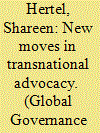| Srl | Item |
| 1 |
ID:
092542


|
|
|
|
|
| Publication |
2009.
|
| Summary/Abstract |
The availability of relatively reliable and comparable data online and the increasing emphasis on statistical and formal research methods has led many political scientists to dismiss research in foreign countries as a waste of time and money. We leave that debate to others (see, e.g., Comparative Politics Organized Section 2005; Qualitative Methods Organized Section 2004). Instead, we offer suggestions for maximizing the contributions of fieldwork to the production of original research. We pay particular attention to research in developing countries owing to the unique challenges of undertaking research there, but we believe our insights are applicable to field research more generally.
|
|
|
|
|
|
|
|
|
|
|
|
|
|
|
|
| 2 |
ID:
090709


|
|
|
|
|
| Publication |
2009.
|
| Summary/Abstract |
Shareen Hertel, Lyle Scruggs, and C. Patrick Heidkamp examine original public opinion data on American attitudes regarding human rights and ethical consumption. They find a higher acceptance of economic rights than have previous studies, and a high willingness to pay for ethically produced goods-though with notable variation among demographic groups.
|
|
|
|
|
|
|
|
|
|
|
|
|
|
|
|
| 3 |
ID:
087334


|
|
|
|
|
| Publication |
2009.
|
| Summary/Abstract |
The ever-widening application of "rights"-based discourse and practice worldwide raises critical research questions which comparative politics scholars are uniquely well-suited to analyze. Yet comparativists often shy away from human rights inquiry. The authors of this article explore the professional deterrents and intellectual challenges that lie behind this paradox. Drawing on their expertise on transitional justice and economic rights, they also indicate concrete ways in which the mass, scope and depth of comparative politics scholarship on human rights could be significantly increased.
|
|
|
|
|
|
|
|
|
|
|
|
|
|
|
|
| 4 |
ID:
073520


|
|
|
|
|
| Publication |
2006.
|
| Summary/Abstract |
Activists involved in human rights advocacy across borders may share common interests in changing the status quo¾but they do not always agree on the rights centrally at issue, nor the best strategy for promoting and protecting them. This is particularly true in campaigns in which "economic rights" claims emerge. Two new mechanisms I develop in this article shed light on the complexities of transnational advocacy and norms evolution. Two case studies offer insights into the operationalization of the mechanisms: a campaign to prevent child labor inBangladesh, and a campaign to prevent employment discrimination against pregnant workers in Mexico.
|
|
|
|
|
|
|
|
|
|
|
|
|
|
|
|
| 5 |
ID:
072298


|
|
|
|
|
| Publication |
2006.
|
| Summary/Abstract |
Measuring human rights is a complex challenge-particularly economic rights, which are by definition "progressively realized" (hence, must be measured over time) and are often conflated with measures of economic development. This article provides an overview of contemporary scholarly and policy efforts at measuring economic rights. It argues for an approach that captures both policy performance and the process by which economic rights can be realized in different societies, over time. Drawing on the author's own research with grassroots economic rights advocates, the article also highlights the political imperative of more effectively measuring such rights.
|
|
|
|
|
|
|
|
|
|
|
|
|
|
|
|